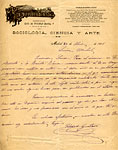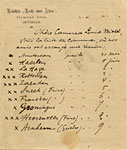Louise Michel through her papers
As a passionate woman
In the biography of Louise Michel that Edith Thomas wrote, she calls her life a "roman picaresque". Indeed, she had a very special life. She describes her as a sentimental and passionate person, who can love and hate with passion. For example, when she was young, she fall in love with Victor Hugo and then with Théophile Ferré. On the contrary, in 1871 she went to Versailles to assassinate the president, Thiers, but then changed her mind.
Louise lived according to very strict principles: for instance, in 1871 she defended herself and refused an attorney at her trial for participating in the Paris Insurrection. She asked the judges to condemn her to death just as they had her close friend Théophile Ferré which was executed on November 28, 1871.
The text here is a poem written by Louise Michel, one year after his death.
Helping humans and animals
Ever since she had been a young girl, Louise Michel could not stand cruelty to people or animals. In her Memoirs, she wrote that she stole money from her grandfather to give to the poor.
In Paris, with other schoolteachers, she took care of people who were ill, she founded an association to teach "mentally deficient children", as she explained it in a book which has the same name. While she was in prison, she was reputed to have given everything she received to the other women.
Louise Michel cared for many such animals in her Parisian flat, especially cats. Indeed, she and her grandfather cared for many ill and neglected animals at their home.
The nurse of her mother, Mrs Chantraine, chides her in the following letter, about the fact she seemed more worried about her cats than her relatives, while in prison.
As a writer
In her biography of Louise Michel, Edith Thomas wrote: "Louise Michel constantly expressed her emotions in verse, and she cribbed masses and masses of prose, leaving most of it in a stage of decidedly rough draft."
Her vocation as a writer started in childhood, for her grandparents used to write poems and verses describing events in their life in a family book. She did this as well. When she was around twelve, she decided to write her own Histoire Universelle because she didn't like Bossuet's.
As a teacher in Audeloncourt she published verses in a local paper under the name of Michel rather than Demahis. She also signed her papers "Enjolras" - the leader of a revolutionary group in Les Misérables - in honor of Victor Hugo.
Afterwards, in Paris, she read a lot and wrote a great deal: poems, novels, tales for children articles, and even an opera. Her friends helped publish her works - she wrote more than 25 books - whenever she was in prison or abroad. She wrote articles and poems in newspapers such as l'Intransigeant, Les Temps Nouveaux, and Le Libertaire, as well as for other newspapers, such as the one below for La voix du peuple socialiste and even for foreigner papers.
As a militant
Louise Michel was not a "native revolutionary" as she wrote in her Memoirs. It was only after she went to Paris that she began to struggle for women's rights. She participated in the Groupe du Droit des Femmes [Women's Rights' Group] together with André Léo (alis Léonide Champseix) and Maria Deraismes. They called for equal education for both sexes. She was also secretary of the Société Démocratique de Moralisation [Democratic Society for Morality], which advocated equal pay for female workers and struggled against prostitution.
Later she became an anarchist and created in 1895, the anarchist group Le Libertaire, both with Sébastien Faure. She gave many lectures in France but also in the Netherlands, England, Belgium and in the North of Africa. She received invitations from Spain and the U.S.A.
As an "ethnographer"
Louise Michel had been greedy for knowledge since her childhood. Then, on August 28, 1873, while she embarked to join New Caledonia, she was not afraid but she was looking forward to it. Her friend Marie Ferré understood this fact and wrote this letter to encourage her. Life conditions were hard in the fortress of Numbo. Anyway, Louise enjoyed it. She didn't stay with the Communards and went to the New Caledonians. She learned their culture thanks to Daoumi, a Melanesian who worked in the fortress. She learned "kanak" language, songs, legends, rites and she wrote the whole things she learnt in special books. Moreover, Louise Michel was very interested in Caledonian vegetation. When she arrived, she built her own greenhouse where she made scientific experiments.
Relations with her mother
Relations between Louise Michel and her mother were passionate. They loved each other but they also fought a lot. In the following letter, Marianne Michel reveals that she was not interested in the activities of her daughter. And she didn't understand her political opinions. She would have prefered a "docile" daughter.
Moreover, Louise Michel tried to reassure her each time she was in prison. In 1883 for instance, she made her believe she was for one year in St Lazare prison as she was for six years in Clermont prison. She even wrote her she had a good bed, a nice view and enough food as she was imprisoned in hard conditions. Her mother was illiterate, that's why it was no so difficult to hide the truth. Moreover, her relatives helped her in this scenario.
Relations with her friends
Letters from Louise Michel papers underline that she had many friends, such as Victor Hugo, Georges Clemenceau, Marie Ferré, Jules Guesde, the Marquis de Rochefort, or the Vaughan family.
She knew Victor Hugo since she was a teenager and sent him her poems. Since that time, they always corresponded with each other. Georges Clemenceau was one of her best friends from Montmartre, even if they didn't have the same political ideas. And then, Louise Michel gave conferences and meetings with the politician Jules Guesde and Marie Ferré. The Marquis de Rochefort and Ernest Vaughan helped subsidize her so that she was able to live decently. Thus, the following letter shows that she was very close to the Vaughan family.
The opinion of the public
According to her papers, Louise Michel received many kind letters from all over Europe. People asked her autographs or her point of view concerning several topics. She always replied them. For instance, she received many marks of sympathy, like this visit card, after the Havre incident in 1888, when a man shot her.
However, Louise Michel also had opponents in powerful circles and the Police observed her thanks to informers. Each time she expressed an unwelcome opinion, she was arrested. She left Paris for London in 1890, tired of the calumny against her, as can be seen in the letter she sent to Mr. Vaughan. As says her biographer Edith Thomas "In prison, as in liberty, people always speak about Louise Michel".










